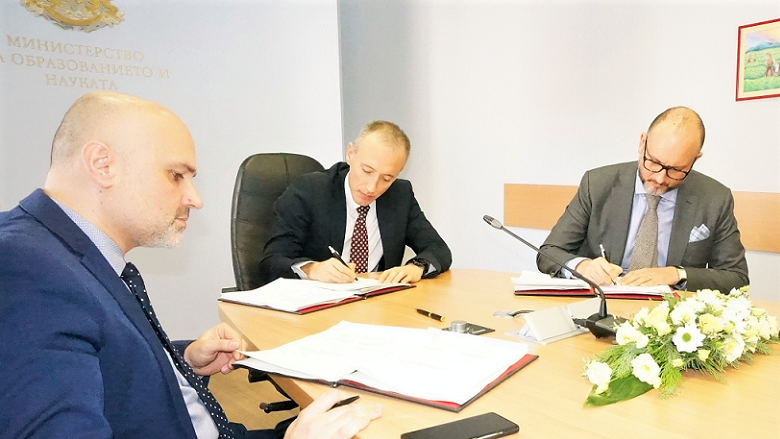SOFIA, February 12, 2020 − The World Bank will provide analytical and advisory support to Bulgaria on how to make the most of public spending on science, technology and innovation, and how to formulate a vision for the education sector until 2030.
An agreement for the provision of Reimbursable Advisory Services was signed today by Krasimir Valchev, Minister of Education and Science, Kiril Geratliev, Director of the Executive Agency Operational Program “Science and Education for Smart Growth”, and Fabrizio Zarcone, World Bank Country Manager for Bulgaria, the Czech Republic, and Slovakia.
The project consists of two inter-related and connected pillars focused on supporting the Ministry of Education and Science in performing a public expenditure review of science, technology, and innovation spending (PER STI), and support to the preparation of the Education Strategy 2030. Both pillars are expected to inform the Ministry’s efforts during preparation for the next programming period with the European Commission.
“Investing in people is a smart policy as it unlocks growth and helps reduce poverty. Aging, high outward migration, labor shortages and skills mismatches call for increased investments in education to be adopted by the Bulgarian government. As a long-lasting partner, the World Bank is honored to help Bulgaria in analyzing its critical investments, by bringing our global knowledge and making sure that every penny is spent wisely,” said Fabrizio Zarcone, World Bank Country Manager for Bulgaria, the Czech Republic, and Slovakia.
Under the first pillar - Public Expenditure Review for Science, Technology, and Innovation - the World Bank will provide ideas for improving the effectiveness of public investments for the sector through reallocation of resources, redesign and rationalization of existing policies and instruments.
Bulgaria’s gross domestic expenditure on research and development (R&D) has improved over a ten-year time frame, increasing from 0.43% of GDP in 2007 to 0.75% by 2017. Yet, this figure is still far from the 1.5% country target by 2020. To bridge the gap between actual and target R&D funding, the country doubled its public research allocation as part of its 2017-2030 Strategy for Research.
Furthermore, this gap is declining thanks to substantial EU funds committed to Bulgaria for the 2014-2020 programming period. Increased spending, however, requires careful assessment of functioning, efficiency and effectiveness before expanding even further. Therefore, the Bulgarian government has asked the World Bank to look closely into the effectiveness and efficiency of public expenditure for science, technology and innovation.
The second pillar will provide strategic inputs to the Ministry of Education and Science on how to shape its education strategy for the next 10 years. A World Bank team of experts will analyze education sector outcomes for the period 2014-2020, after which the team will review preschool, general school, vocational education and training, higher education and life-long learning in Bulgaria. The objective is to provide ideas about how to strengthen the school system, with a view to equipping Bulgarian students with the skills they need to lead successful and productive lives in the future economy.
The agreement signed today needs parliamentary ratification to take effect. The analytical work undertaken by the World Bank will be the property of the Bulgarian government.

